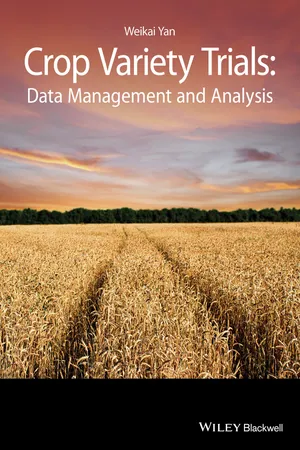
Crop Variety Trials
Data Management and Analysis
Weikai Yan
- English
- ePUB (disponibile sull'app)
- Disponibile su iOS e Android
Crop Variety Trials
Data Management and Analysis
Weikai Yan
Informazioni sul libro
Variety trials are an essential step in crop breeding and production. These trials are a significant investment in time and resources and inform numerous decisions from cultivar development to end-use. Crop Variety Trials: Methods and Analysis is a practical volume that provides valuable theoretical foundations as well as a guide to step-by-step implementation of effective trial methods and analysis in determining the best varieties and cultivars.
Crop Variety Trials is divided into two sections. The first section provides the reader with a sound theoretical framework of variety evaluation and trial analysis. Chapters provide insights into the theories of quantitative genetics and principles of analyzing data. The second section of the book gives the reader with a practical step-by-step guide to accurately analyzing crop variety trial data. Combined these sections provide the reader with fuller understanding of the nature of variety trials, their objectives, and user-friendly database and statistical tools that will enable them to produce accurate analysis of data.
Domande frequenti
Informazioni
Chapter 1
Theoretical Framework for Crop Variety Trials
Key points
- The ultimate purpose of crop variety trials is to identify superior cultivars for a given target environment. The target environment is the sum of the environments that are likely to be encountered in a target region across years.
- The heritability of a trait obtained from a variety trial system is a measure of the system's ability to reveal any genetic differences among tested genotypes for the trait.
- Heritability is a relative measure of the genetic variance (G) versus the genotype-by-environment interaction variance (GE), ignoring any experimental errors. So G and GE must be considered simultaneously in variety evaluation.
- Heritability must be estimated in the genotype–location–year framework because superior cultivars must be identified in test environments representative of the target environment.
- Heritability estimated in the genotype–location–year framework facilitates appreciation of the relative power of a single-trial, multilocation trials in a single year, and multilocation trials in multiple years.
- Variance components constituting heritability in the genotype–location–year framework can reveal possible approaches to improve the efficiency of variety trials, which are the topics of this book.


